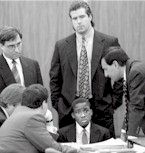|
|
The prosecutor in the case against Nathaniel Jamari Abraham says the boy will now get the help he needs. But others say the case only opens the floodgates for trying more children as adults. "This case was about intervening on behalf of a troubled and dangerous youth who needed help and didn�t get it a long time ago," prosecutor David Gorcyca said, during a Nov. 16 post-verdict press conference. "My whole intent was to not throw away the key on an 11-year-old boy, now 13. My intent was to give him the help that he needed," he said. Prosecutors foresee the help coming from a "blended sentence," which will keep the boy imprisoned until at least age 21. Then his case will be reviewed to see if he has been rehabilitated. In October 1997, Nathaniel shot Ronnie Greene, who was standing across the street, using a stolen .22 caliber rifle. Prosecutors said Nathaniel meant to shoot the 18-year-old, but defense lawyers insisted the bullet ricocheted off of a tree and the death was a tragic accident. A jury acquitted Nathaniel of three charges, allowing his defense to challenge the second-degree murder conviction. The boy is the youngest person in U.S. history tried as an adult and convicted of murder. He could be sentenced to life in an adult facility. Sentencing is scheduled for Dec. 14, in predominantly white Oakland County. "Right now Congress is working on juvenile justice legislation that includes a lot of things that will expand the age that juveniles can be tried in federal courts as adults. It just seems that more and more states are trying juveniles as adults," said Kara Gotsch, of the ACLU�s National Prison Project. "The Children�s Defense Fund puts out statistics that children who are tried as adults are a lot more likely to recedivate especially for individuals who are housed in adult facilities. They are much more likely to be abused by other inmates, other correctional staff. They are not likely to receive proper educational programming. So there�s a whole host of things that could go on that make this type of trend very alarming," she said. She and others use Nathaniel�s case as an example that harsh sentences don�t deter youth crimes. Children are impulsive and don�t understand the consequences of their actions, so punishment doesn�t prevent crime, they argued, adding that more money should be invested in intervention and prevention programming. "I think it�s sad that the only way for someone to get help is for them to be incarcerated," Ms. Gotsch said, noting that Nathaniel�s mother had sought help for him before the shooting, but neither police nor courts did anything. "This is a very dramatic shift we�re going through. Now the irony of trying 13-year-olds as adults is that we have a young boy who society said is not old enough to drink, to drive, to join the military or to vote. Yet he�s old enough to be tried in an adult court, to apparently understand the dynamics of the adult system and to make reasonable decisions about how his defense should proceed," said Marc Mauer of the Sentencing Project, in Washington, D.C. "In every way they have the expectations that he�s acting as an adult even though in no other area would we expect that he�s mature enough to do that," Mr. Mauer said. The current trend goes against 100 years of juvenile justice law, which says children should not be treated as adults, Mr. Mauer continued. The entire juvenile justice system sprang from that idea, he said. "While it may have been unthinkable to try someone a few years ago for a crime committed at the age of 11, now that has been demonstrated to be a possibility. It is certainly conceivable that we can see 10- or 9-year-olds prosecuted in the not so distant future also," Mr. Mauer said. Many states have lowered the age of adult jurisdiction to 16 and 17, where defendants are automatically tried as adults, Mr. Mauer explained. "If you include all those states there are actually about 200,000 juveniles (awaiting trial) as adults," he said. Like others, Mr. Mauer sees Black youth disproportionately hurt by such decisions. The Michigan law allows for "the criminalization of Black youth and is part of the overall attempt to destroy Black youth, African people in general, and to do so by means of evoking justice that becomes a �legitimate effort.� The more of our youth and men that are drawn into this system of so-called justice the more crippled we are as a people to rejuvenate ourselves," said Desiree� Ferguson, co-chair of the National Conference of Black Lawyers in Michigan. Some law enforcement officials said Nathaniel�s case proves the need to get tough with children who are menaces to society. Old juvenile justice laws didn�t envision children who rob and murder others, they say. J.L. Chestnut, an attorney in Selma, Ala., sees things differently. "This country has lost sight of what justice means. We are now scared to death of drugs, crime and young Black men. To convict one of murder who was 11-years-old is an outrage and shows how far off from the path we�ve traveled," he said. |
 PONTIAC, Mich.�The case of a 13-year-old boy convicted as an
adult for second-degree murder has rekindled debate about how to handle
troubled youngsters.
PONTIAC, Mich.�The case of a 13-year-old boy convicted as an
adult for second-degree murder has rekindled debate about how to handle
troubled youngsters.